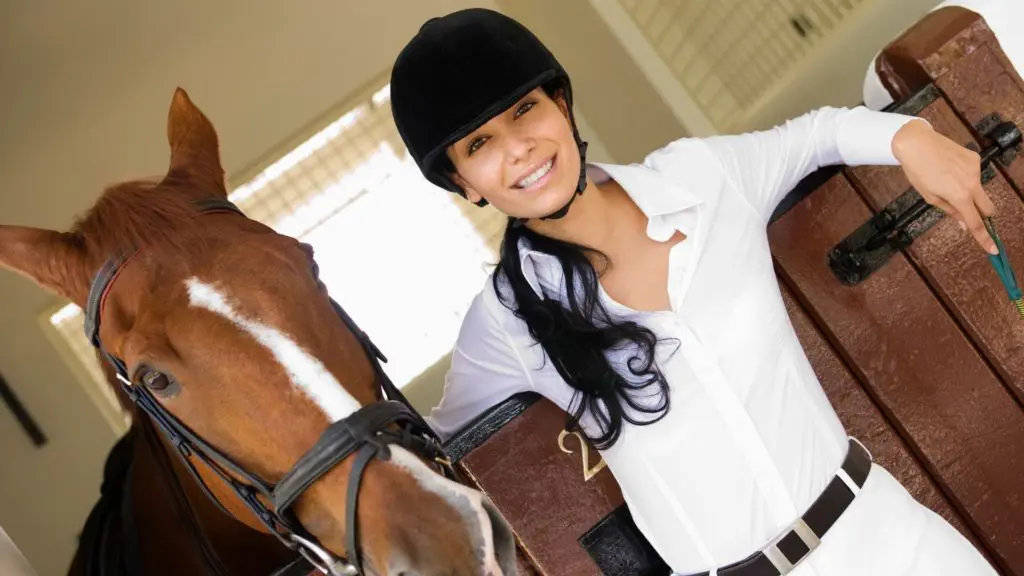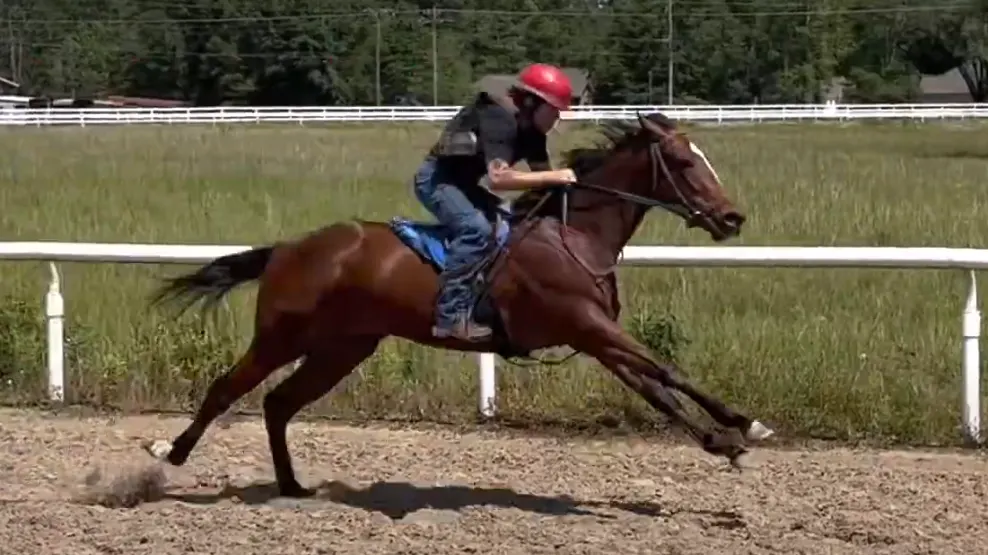Last updated: May 30, 2022
Any links on this page that lead to products on Amazon are affiliate links and I earn a commission if you make a purchase. Thanks in advance – I really appreciate it!
My grandson recently asked me if it’s okay to wear his bike helmet when horse riding. Before answering him, I took a good look at the helmet, and it seems pretty well built, but I decided to research the safety features of bike helmets before letting him use it for horse riding.
You can wear bike helmets while horse riding, but they aren’t safe because they don’t adequately protect your head. And most horse riding facilities that require riding helmets only accept certified horse riding helmets and will not allow you to ride with a bike helmet.
Many people think all helmets are the same, so why not wear a bike helmet horse riding? And if helmets are necessary when riding horses, why do most Western riders wear cowboy hats instead of helmets? I have the answer to these questions and more.


Equestrian helmet vs. bike helmet
Horse riding involves very different injury risks than bike riding. Therefore, there are apparent differences between equestrian and bike helmets, and it’s not recommended to mix the two up.
The basic shape of equestrian and bike helmets differs. Bike helmets are designed to be aerodynamic, while horse riding helmets have a curved shape. Horse riding helmets cover more of the lower back portion of your head, while bike helmets might offer better protection from front and side impacts.
Further, bike helmets aren’t rated to protect against falls from tall heights like eight or nine feet, which can be expected when a person is thrown from a horse. Unlike bike helmets, equestrian helmets are also designed to withstand hoof strikes.
The pros and cons of wearing a helmet when riding a horse
There is not much room for debate when it comes to the question of wearing a helmet when riding a horse. Almost every time you ride a horse or are around lots of horses, you should be wearing your helmet. Still, riding horses with a helmet is not a popular trend, so it’s worth looking at both sides of the equation.
Why you should wear a helmet when horseback riding
The Center for Disease Control and Prevention (CDC) reports that, on average, horseback riding results in almost 3,500 non-fatal traumatic brain injuries (TBIs) a year. The numbers don’t include riders younger than 18 and those living outside the US. The total number of injuries caused by horseback riding is probably a lot higher.
Just as seatbelts reduce the chances of injuries but don’t guarantee total protection, helmets serve the same purpose. When you are wearing a helmet, you can reliably prevent a concussion or severe brain injury from otherwise severe accidents.
More importantly, helmets for kids and lesser experienced riders are a must, so you have to set a good example for them.

Riders often get involved in car accidents or hit their heads on hard surfaces such as overhead branches or training obstacles. Helmets are also viable protection against these types of incidents.
Experienced riders don’t bother with helmets as often as novice riders. Sadly, my experience with people and horses taught me that when people are around horses frequently, they develop an unhealthy sense of security.
People either never learned or seem to forget horses are prey animals and often react to things in ways difficult to predict.
Why wearing a helmet when horseback riding is a bad idea
There are no good arguments for not wearing a helmet when horseback riding since the potential dangers outweigh any issues you may have with helmets. However, the majority of seasoned equine riders prefer to wear anything but a helmet when horse riding.
If you aren’t concerned about injuries when horseback riding, then here are some reasons people avoid riding with helmets:
- Most helmets aren’t your friends if you want to maintain fancy hairstyles. People often complain about their hair getting sweaty, even in helmets designed for good airflow.
- Many riders feel uncomfortable or hot when wearing a helmet. So if you like to go for casual morning rides with your horse, you might want to enjoy the fresh breeze and feel one with nature without wearing a helmet.
- Finally, you don’t look as “cool” in helmets as in cowboy hats. If you want to look good for a wedding photo or some festive occasion, it’s okay to briefly ride a horse without a helmet.
Honestly, these are the only reasons I can think of for not wearing a helmet. I personally don’t recommend ever riding a horse without a helmet, but it is ultimately up to the rider to weigh their options.
Prices pulled from the Amazon Product Advertising API on:
Product prices and availability are accurate as of the date/time indicated and are subject to change. Any price and availability information displayed on [relevant Amazon Site(s), as applicable] at the time of purchase will apply to the purchase of this product.
What is the safest helmet for horseback riding?
The safest helmets for horseback riding are not the most expensive. In the US, all helmets have to meet some standard safety requirements. The difference between brands is mainly in the styling, airflow, or general ease of use.
Buy helmets certified by the American Society for Testing and Material (ASTM) or Safety Equipment Institute (SEI) to satisfy all the necessary protective requirements. The helmet should also be made for equestrian purposes and fit your size.
It’s crucial that your horse riding helmet is snug but not so snug that it’s uncomfortable. The front of a properly fitting helmet should be about an inch above your eyebrows, so it doesn’t impede your vision, and you shouldn’t tilt it to the side, keep it level across.
After you put it on, try shaking your head up and down and all around; the helmet shouldn’t slide.
Loose helmets might not protect you in an accident. Similarly, if your helmet’s taken some blows or been hit frequently, you should probably get a new one. The damage might not be apparent, but the helmet loses some of its protective capability.

Why don’t Western riders wear helmets?
When I compare Western and English riding disciplines, the first thing that stands out is that most Western riders don’t wear helmets.
Wearing cowboy hats and good-looking boots seems to be a necessity with many Western riders without regard for safety. So, why do Westerners often disregard such an essential safety requirement?
The primary reason Western riders don’t wear helmets is to preserve the historical culture of Western horse riding. Cowboy hats are the essence of Western fashion, while helmets are relatively new and mostly limited to English riding.
Many in the Western riding community believe a close relationship with their horse and careful riding are sufficient to prevent severe injury. And others are reluctant to put on their helmets because they want to fit in with their peers.
Some Western riding competitions are also relatively safe and helmets aren’t needed, such as halter showmanship and Western pleasure. English competitions especially showjumping and eventing are extremely dangerous and to participate helmets are required.
However, in the United States, upper dressage level riders aren’t required to wear helmets, and hats are traditionally preferred. In contrast, even in dangerous competitions, Western riding associations, like bronc ridings, barrel racing, or steer wrestling, leave the decision to wear a helmet or not up to the participant.
Luckily, there has been a trend toward more Western riders wearing helmets, and cowboy helmets are replacing hats in many Western communities. The Tippery company recognized this trend and designed a Western riding helmet to fill the demand.

How long does a horse riding helmet last?
Horse riding helmets don’t last forever. Even if you don’t wear them very often, the helmets’ foam and internal layers lose their effectiveness over time.
Horse riding helmets last a maximum of five years. If a helmet hasn’t taken any damage, you should still change it after three or so years if you use it regularly. It’s typically not possible to recognize the damage without special equipment.
Suppose you were in an accident while horse riding or your helmet got visibly damaged somehow. In that case, it’s best to replace it immediately, especially if you are into extreme sports like polo.
Even cheap helmets offer standard protection, and not replacing a faulty helmet can cost you a lot more money if you get a severe injury.
| Brand | Price | Prime | Learn More | |
|---|---|---|---|---|
Top | Ovation Deluxe Schooler Riding Helmet – ASTM Certified for Equestrian Competition | Prime | Learn More | |
 Top
Top | Troxel Spirit Performance Helmet, | PrimeEligible | Learn More | |
 | Troxel Liberty Horseback Riding Helmet | Prime | Learn More |
Below is a YouTube video about bike helmets and riding horses.
FAQ
Can you wear a horse riding helmet for bike riding or skateboarding?
Of course, you can wear any helmet you want, but it’s best to wear the correct headgear for the sport it’s designed for. An appropriate helmet is designed to protect against the inherent risks of the sport. Unlike equestrian helmets, bike helmets are generally meant to offer protection for higher speeds, and skateboarding helmets are intended to withstand multiple impacts at a time.
The general rule of thumb when shopping for helmets is that each sport has its helmet. It might be tempting to wear your horse riding helmet for bike riding or skateboarding, but it’s not wise for your safety or performance.
Is it illegal to ride a horse without a helmet?
There is no federal law regulating the use of helmets. But states, cities, or counties may have laws that require you to wear a helmet when horseback riding. For example, in Norco, California, they require helmets for riders under the age of 18.
Similarly, helmets are mandatory for youths under the ages of 16 and 14 in Florida and New York, respectively. However, all such helmets must be ASTM/SEI certified according to the US Equestrian Federation. The rules for wearing helmets in competitive sports vary greatly. So always check the laws where you intend to ride.
